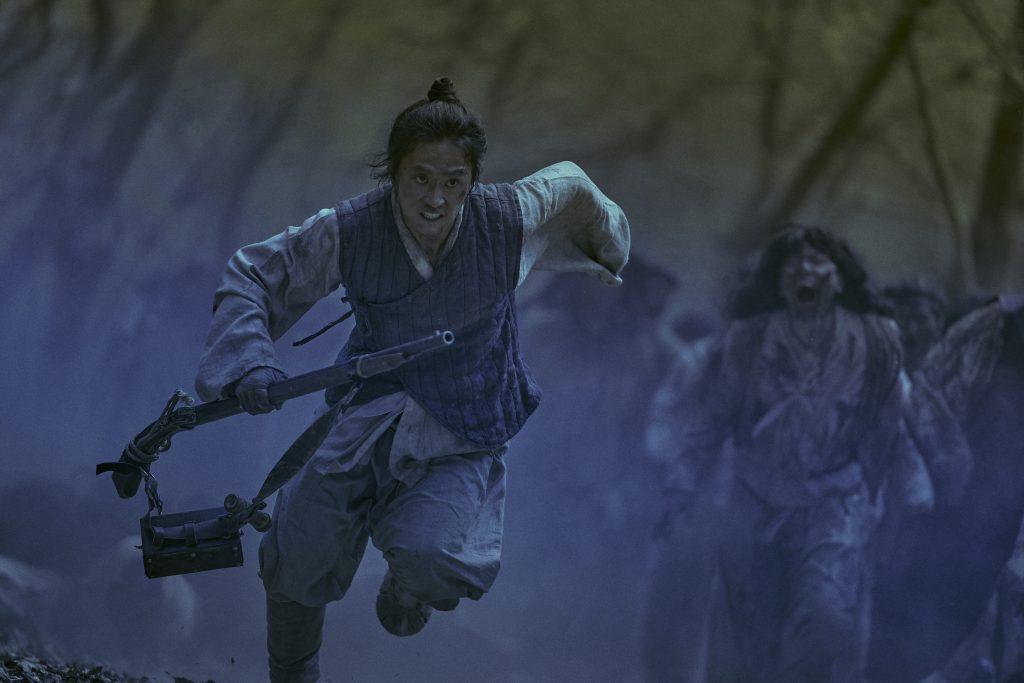Ingenious fusion of horror and Korean history maneuvers a breakthrough series in Netflix’s Kingdom.
A solid concoction of suspenseful plot staged in Korea’s traditional period guarantees viewers a scary but sweet ride — when Kingdom begins its rule on Netflix beginning January 25.
Layering history-inspired fiction with modern supernatural element, Netflix original series Kingdom takes you to switching level of thrills which decelerate quickly, only to upsurge the tension with its impressive cliffhangers.
Evidently proving why Netflix chose Kingdom as one of its pioneering Korean series production, the first season grips your attention fast with its dynamic yet clearly-pictured narrative.
- Main Cast: Ju Ji Hoon | Bae Doo Na | Ryu Seung Ryung
- Streaming Site & Episode Count: Netflix | 6 Episodes
![]()

Kingdom Quick Review
- Plot Trajectory: Strong Start – Scintillating Ending
- Plot Pace: Highly-addictive and mind-blowing
- Character Portrayal: Solid main leads and supporting cast
- Writing: Full Marks on balanced execution of themes
- Watch on a binge or intervals?: Binge
- Crowning Moments: Enthralling Plot | Deftly Portrayed Characters
- Thrill/Addictive Meter:

- Overall Rating:

- Rewatch Value:

- K-Dramas of Similar Vibe: Kingdom 2
Kingdom Series Highlights
A Historical K-Drama That Bites Back
Korean period dramas (sageuk) often get a bad rap for being slow burns, tangled with intricate politics, endless side plots, and an overload of court drama. But Kingdom breaks that mold—brilliantly.
Right from the opening scenes, Kingdom wastes no time. The writing gets straight to the point, introducing the central conflict with sharp clarity: a mysterious plague is threatening the Joseon dynasty—and no one is safe. This directness is refreshing and especially appealing to viewers who normally find historical dramas too heavy or meandering.
Instead of being bogged down by filler arcs or excessive subplots, Kingdom keeps its narrative tight. The story avoids unnecessary detours, allowing the main tension—surviving a zombie outbreak amid political corruption—to build organically. And it works. Every twist, every reveal feels like it’s earned, and more importantly, it keeps the pacing electric.
Of course, no sageuk is complete without power struggles, royal dysfunction, and morally bankrupt politicians—and Kingdom delivers all of that. But what sets it apart is its genre-bending brilliance. The supernatural element—zombies—isn’t just a gimmick; it’s the narrative engine. The horror is expertly woven into the story, adding not just scares, but urgency, claustrophobia, and an unpredictable edge to the otherwise familiar palace intrigue.
Visually, the show is stunning. The costumes, the eerie soundscape, and the sweeping shots of undead hordes against moonlit backdrops create a unique atmosphere where beauty and brutality collide. Fight scenes are intense and graphic—so if you’re squeamish, consider yourself warned. Yet, these moments aren’t mindless gore; they’re carefully crafted to serve the plot and develop character dynamics under extreme pressure.
Beyond the fear factor, Kingdom succeeds because it never forgets to tell a human story. The characters are not just reacting to zombies—they’re reckoning with loyalty, betrayal, leadership, and legacy. From the righteous Crown Prince Lee Chang to the ambitious and cold-blooded Queen and her father, each role adds a distinct layer to the unfolding chaos.


Kingdom Series Musings

Kingdom wastes no time in establishing its dual narrative core: a gripping political power struggle and a terrifying, fast-spreading undead epidemic. It is unambiguous in its intent—to unravel the rot festering both in the bodies of the dead and in the seat of Joseon’s power.
What makes Kingdom stand out is how it treats its horror element not as a gimmick, but as a crucial narrative device. The plague isn’t merely an external threat—it’s a symbolic force that exposes corruption, greed, and the devastating price of unchecked ambition. It raises the stakes in the already volatile royal court, revealing how human evil can be more chilling than reanimated corpses.
The pacing is taut and purposeful. The “oh no, the zombies are coming!” moments arrive with just enough frequency to jolt you, yet never feel gratuitous. The suspense coils tightly around each episode, drawing you to the edge of your seat—and then, just when you think you’ve caught your breath, it lunges again. It’s relentless. But addictive.
Ju Ji Hoon’s Prince Chang is a compelling protagonist. His moral compass is tested not only by the plague but by the treacherous waters of succession, betrayal, and secrecy. With enemies both undead and political, he is constantly walking a tightrope—one that could snap at any moment.
By the time the finale rolls in, you’re not just intrigued—you’re hooked. The cliffhanger is brutal, not because it shocks for shock’s sake, but because it deepens the mystery and heightens the urgency. There’s no question: Kingdom Season 1 doesn’t end. It beckons. It dares you to want more, need more, even obsess over when the second season will come.
And if you’re anything like me, the wait will gnaw at you just as ravenously as the infected do in this beautifully bleak, blood-soaked kingdom.

Photos: Netflix




